Catching Up With the Devil in Grendel Devil’s Odyssey by Matt Wagner
As Wagner writes this story of Grendel encountering these worlds and civilizations to determine if they fall in the parameters of his mission, there’s an unspoken question of his own place in this future that he’s trying to ensure. Is he a real boy?
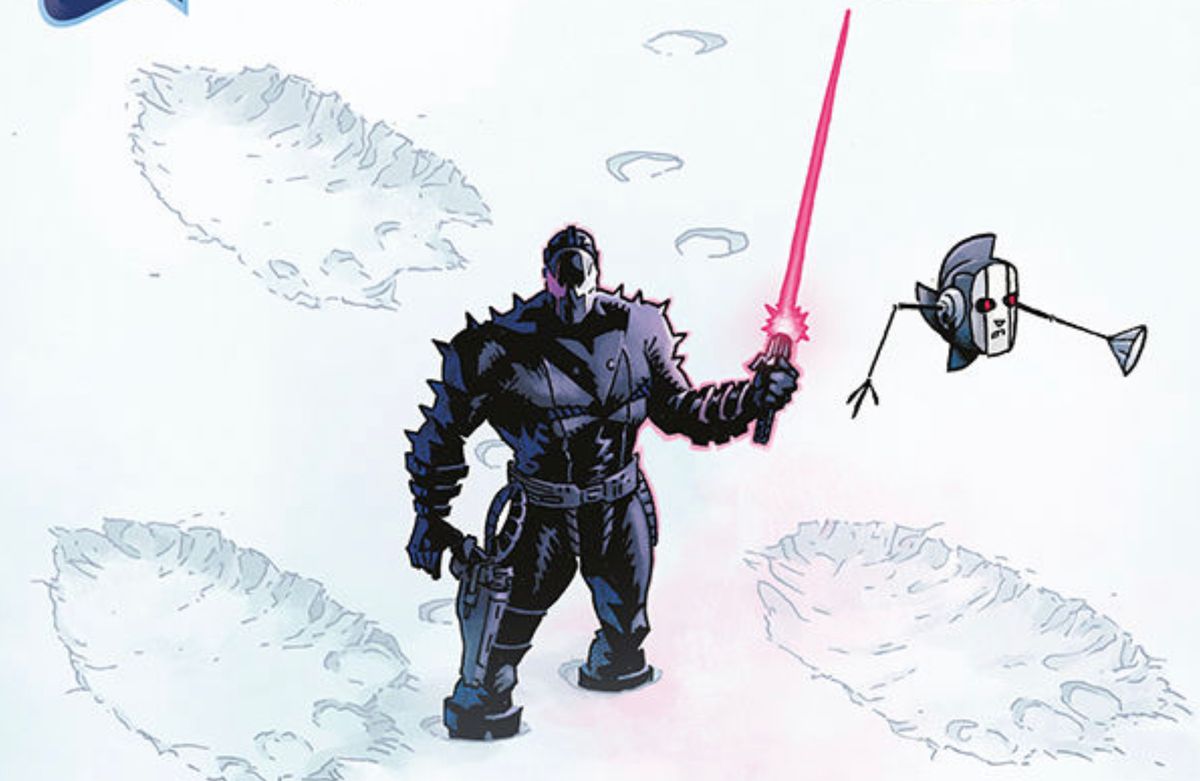
Matt Wagner’s earliest Grendel stories were about singular characters like the debonair high society author Hunter Rose or Christine Spar, Rose’s biographer and the second Grendel. These stories revolved around distinct characters who wore the Grendel identity as a thing thrust upon them and their souls. Wagner showed Grendel as some malevolent force that could influence or even inhabit these characters: the spirits of Rose and Spar shaped the manifestation of their Grendel as much as Grendel changed them. Even the paranoia of Brian Li Sung or the madness of Eppy Thatcher created a starting point for Wagner to ground his characters in and build the idea of Grendel around. These characters gave the creator and the reader something to latch onto as Wagner showed the Grendel spirit/persona/virus as something that wore away at the characters, that used them and spit them out before moving on to its next host.
But those characters were a long time ago; they’re part of a history of comics and storytelling that is rooted in the times that they were created (which is the early 80s to the mid 90s.) Each new Grendel built on the Grendel that came before them but also fed on the humanity that was left in these characters. So maybe it makes sense that eventually Wagner would create Grendel Prime, a cybernetic warrior that had almost no humanity to begin with. He had no past, no story of who he was, no motivations or agency beyond what he was created to be both within the confines of the story but also as a character created by a comic book cartoonist. Wagner landed on this Terminator-like version of his Grendel thirty years ago. Now in 2022, Grendel Prime doesn’t feel like a character but more like a tool, directed and ordered by superiors, not making decisions or pursuing any agenda of his own but focused on the mission, whatever that may be.
And even that’s probably simplifying a lot of what Wagner has done with Grendel Prime over the years but when you look at the charisma of Hunter Rose in those early stories and the general detachment of Grendel Prime in nearly every story of his, there is this disconnect in the legacy of the character that showcases Grendel Prime more as a force than as a character. So as the earth is dying and humanity is on the verge of war and extinction, the Grendel-Khan of this dying planet sends Grendel Prime on a mission into space, with orders to find a planet that could sustain the remnants of mankind and give them a future that they no longer have on Earth.
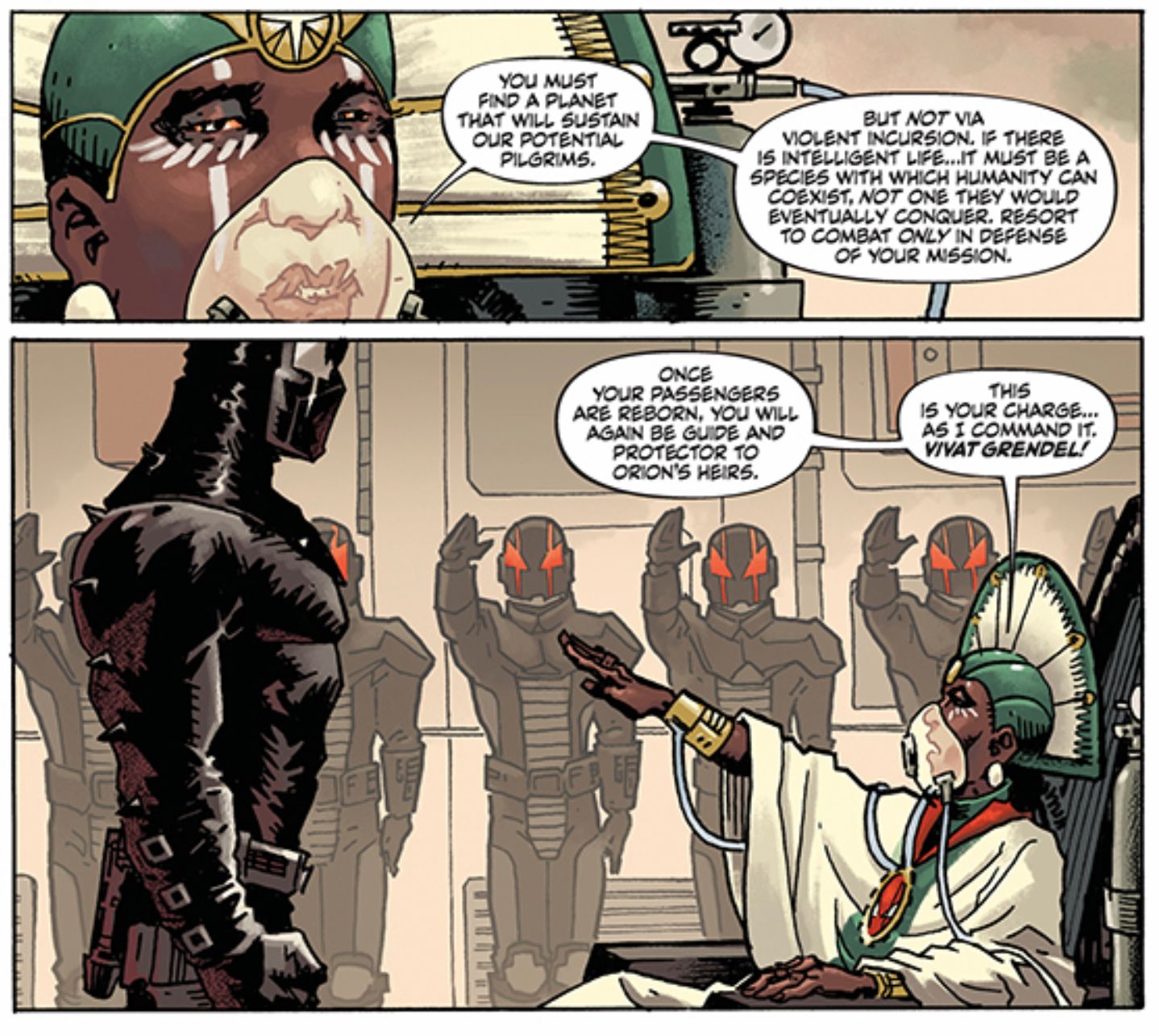
Grendel; Devil’s Odyssey is the story of Grendel Prime on this huge quest with the weight of mankind’s survival on his broad shoulders. It's also the story of Grendel Prime rediscovering his humanity in the far depths of space, away from the mankind he was created to protect and the weak humanity that needs him to do the work that it can’t do itself, away from the weak Khans who give him orders and point him at targets. Returning to the Grendel Prime character, Wagner returns to an adventure-driven story where motivations and actions are clear and understandable; find a suitable planet for the next iteration of humanity to survive and thrive on. Here Grendel Prime is actually a fairly easy character to get your head around. He’s a man with no past and no future— just existing in an unending now. At least 100 years, if not far more than that, have passed in the story since Wagner first introduced Grendel Prime in Grendel: War Child but the character remains unchanged; he just is. If the character was a little bit introspective, he would see his responsibilities as a trap, as a dead end. He’s lived a long time, served many masters, killed a lot of men and women, and followed every order. This is what his life was, is, and will be.
So Grendel Prime is given a directive- find a planet suitable for mankind. But there’s an interesting twist to it. The Grendel Khan (just think the king who orders his honorable knight on a quest,) has a simple requirement for this new Earth. “You must find a planet that will sustain our potential pilgrims,” the Grendel Khan commands Prime. “But not via violent incursion. If there is intelligent life… it must be a species with which humanity can coexist. Not one they would eventually conquer. Resort to combat only in defense of your mission.” We talk about Grendel Prime being a warrior but it’s interesting how Wagner shows him being used. When he was first introduced in Grendel War Child, it was also there as a protector of a child, the rightful Grendel Khan of that day. Prime was to hide him and protect him until the day that the boy could take the throne himself. And here again, he is taking on the role of protector.
Accompanying Grendel Prime on this mission is a drone, Sigma Seven, or “Siggy” as she prefers to be named and identified as. Right from the first page, we see the difference between these two characters, the stoic and determined Prime and the personable and very human Siggy. It’s a bit of an odd couple situation that Wagner establishes with these two, practically equals on this mission even as their roles in it are so different. Siggy is Prime’s Jiminy Cricket, that voice that grounds this Grendel in his quest. And the Pinocchio links go deeper than that, as Grendel has to wrestle with his own, long forgotten humanity. As Wagner writes this story of Grendel encountering these worlds and civilizations to determine if they fall in the parameters of his mission, there’s an unspoken question of his own place in this future that he’s trying to ensure. Is he a real boy? Does he have a place in this next stage of humanity that he’s trying to find?
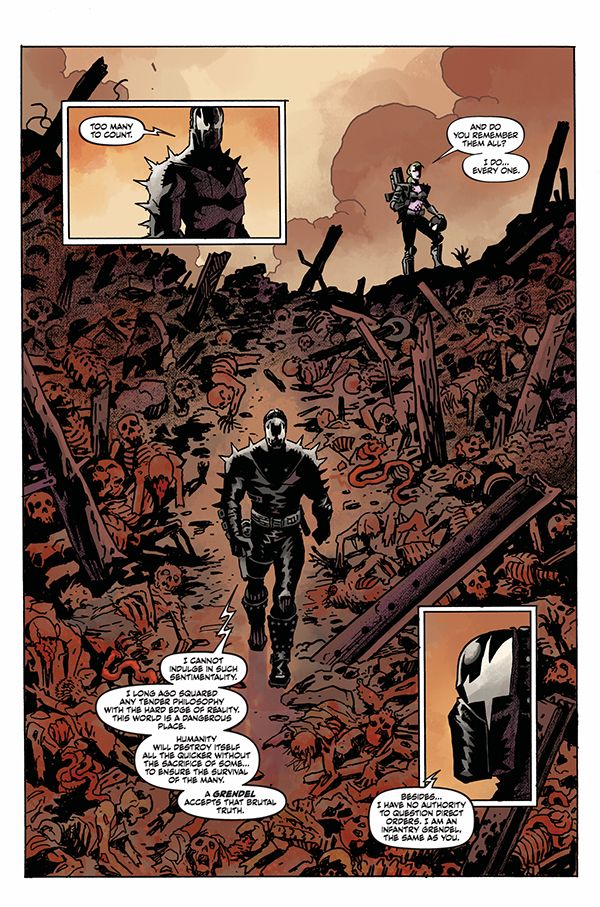
Wagner’s artwork doesn’t give a lot of room for that kind of doubt to creep into the story. It’s fascinating to use all of his artwork in the Grendel mythology to chart the evolution of an artist, from a budding neophyte who’s learning on the job, to wunderkind genius doing things that we haven’t seen before, to old school, solid, dependable, and professional in every way. He’s not the flashy artist or storyteller that he once was. Just that a look at one of the earliest Hunter Rose stories Devil By The Deed for an artist who was flexing every possible muscle. The Wagner who draws Grendel: Devil’s Odyssey focuses on the panel-to-panel beats of the storytelling, occasionally having a WOW!!!! image but more concerned with clearly communicating the story to his readers.
But Grendel Prime wears a full face helmet that is unmovable and unchanging. Think for a moment how expressive Spider-Man is because of how artists use his mask and particularly the eyes in the mask to show emotions. The Grendel mask is very similar with its design but Wagner uses it and its variations to show the differences in the Grendels, not the differences in their reactions to things. That’s why the Grendel Prime is a difficult character to read. His face carries no emotions, which helps convey the immutability of the character and his mission. His helmet is a true mask, hiding any reactions or emotions.
So Siggy acts as that offloaded conscience for Grendel, guiding and advising Grendel Prime on this mission that’s basically looking for the next colony of humanity. It’s fascinating to watch Wagner wrestle with his own viewpoints of mankind and our desires to take over everything. Wagner wants to be hopeful, wants to believe in the potential of the good we can do but is a bit cynical and pessimistic about what we’re truly capable of. His work in the Mage series offers a far more optimistic and personal view of this but Grendel allows him to take a step back and be a bit more realistic in his views. If nothing else, Grendel allows him to give into his darker thoughts. Mage always feels more personal because it is semi-autobiographical, Wagner getting to wander through his own life. It’s easy to view Grendel as something else, something different.
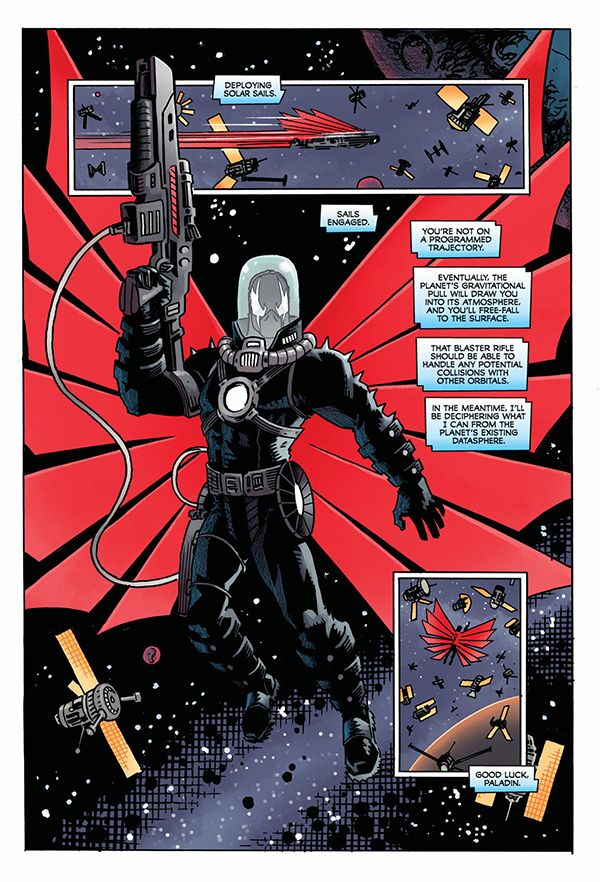
As Grendel Prime encounters different worlds and civilizations (6 different ones in Grendel: Devil’s Odyssey’s 8 chapters,) Wagner places trust in his character to find the right world for humanity to make its new home. Grendel encounters various civilizations and worlds that just don’t quite fit the parameters of his mission. But on the penultimate world, he takes on a fascinating role of justice and liberator for an oppressed people. It not an unfamiliar role for the character; it’s one he’s worn when ordered to do so. But here he is on another mission and he’s diverted from it, wandering this world almost like a man with no name, bringing his own sense of justice to it. It almost feels like growth for a character who is practically impervious to it.
And in the final chapter, Grendel, Siggy, and mankind are judged. It’s the moment of truth as Grendel and Siggy find themselves in the presence of a more advanced society of beings. This is a point where this Grendel has to face questions about his own purpose in ways that no Grendel has done before. Wagner finds this truly unique challenge for the character, putting him in the position of possible failure which is something that Grendel Prime has barely faced before. It’s a challenge for the character that helps him become something more than the Terminatoresque force that he’s been before.
Grendel; Devil’s Odyssey opens the door to the next cycle of Grendel stories and it will find the character at an interesting point in his existence, which feels like new and intriguing ground for Grendel Prime. The book returns us to this work where a spirit or a force (call it what you will) permeates every corner of the earth. So what will that spirit find on other worlds? In Grendel, Wagner has this freedom to change the scope and the stakes of the story, going back and forth between a macro and micro view of what Grendel is. This book is a grand, expansive story that completely broadens the idea of this world and concept. But the story also reframes Grendel Prime, giving him a quest but also delving into this fascinating character in ways that Wagner hasn’t been able to do before.
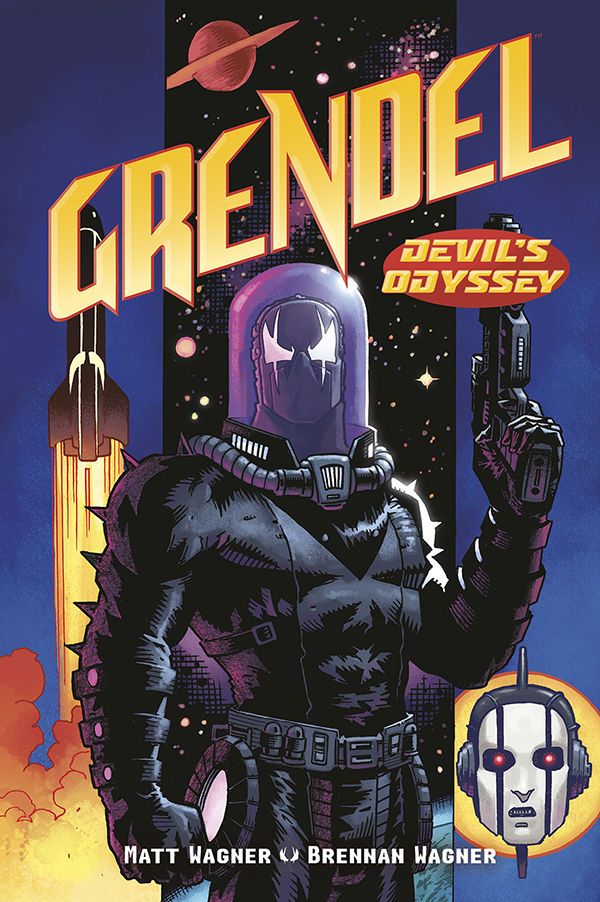


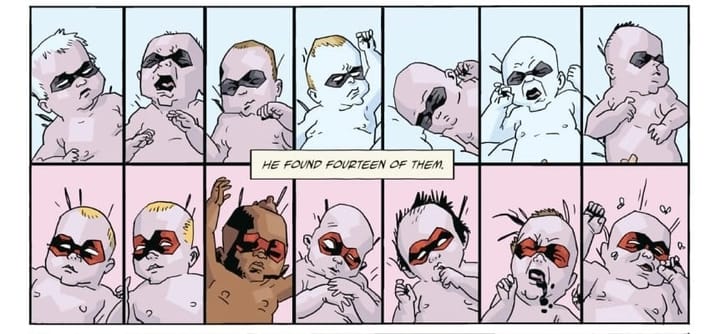

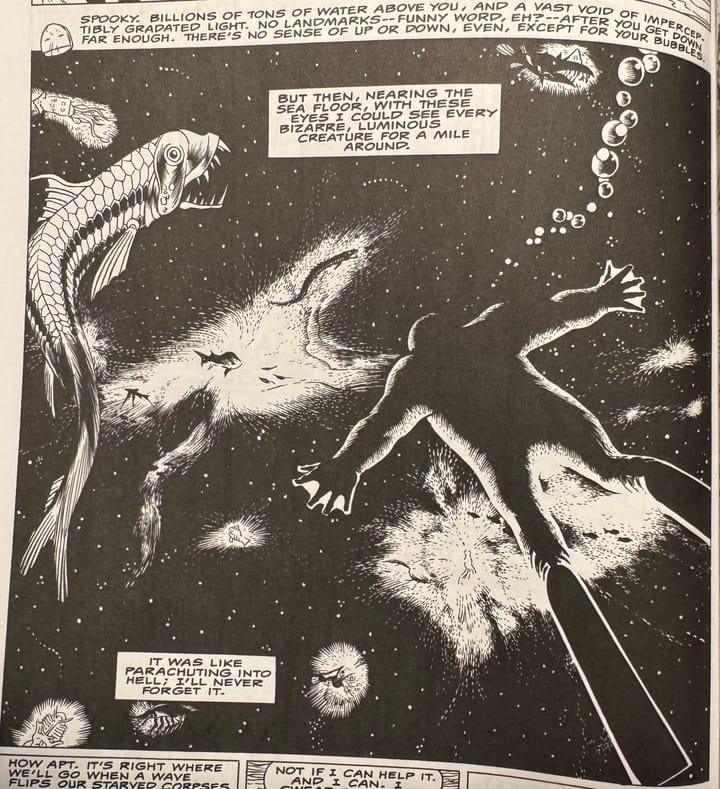
Comments ()